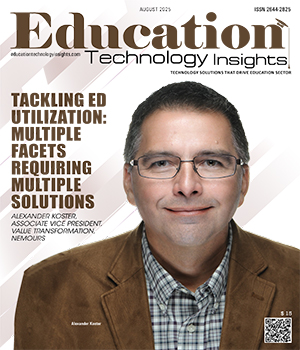THANK YOU FOR SUBSCRIBING
Be first to read the latest tech news, Industry Leader's Insights, and CIO interviews of medium and large enterprises exclusively from Education Technology Insights
The Evolving Role of Science Libraries and Librarians in the Digital Age
Renaine Julian, Director of STEM Libraries, Florida State University.
 Renaine Julian, Director of STEM Libraries, Florida State University.
Renaine Julian, Director of STEM Libraries, Florida State University.Renaine Julian is the Director of STEM Libraries at Florida State University. In this role, he leads and collaborates with a team of science librarians and staff that partner with and provide support for STEM scholars across the research and learning lifecycles. Prior to that, Renaine served at Florida State University as a Data Research Librarian, STEM Data and Research Librarian, as well as the Associate Director for STEM Libraries.
Please tell our readers about your journey in the industry.
While pursuing a master's degree in urban regional planning at Florida State University, I worked part-time at the library and developed an interest in data management and academic libraries. This led me to enroll in a master's program in Library Information Studies and work full-time at the library. I was subsequently hired as a First Data Librarian at FSU, where I created a consultative data services program and assisted users in tool selection and data visualization.
Over time, I was promoted to head of STEM Libraries, where I established a new team of librarians to design library services and programs specifically for STEM scholars. In the past, academic libraries had primarily focused on social science and humanities scholars. However, with the increased availability of scientific information and technology, there was a need to shift focus to cater to the needs of STEM scholars. Our team worked closely with faculty and research offices to pilot new services and innovative programs that addressed the unique needs of STEM scholars.
“We have noticed a shift towards online and asynchronous learning content creation that began prior to the COVID-19 pandemic. We have realized that these types of learning materials can be an effective replacement for traditional classroom teaching methods.”
What are the challenges that you have observed in the industry?
The changing and evolving needs of scholars pose a significant challenge for science libraries and librarians. It is not enough to simply respond to these changing needs; libraries must also anticipate future trends and stay ahead of the curve. This is particularly important given the push for greater public access to scientific information, as mandated by the Office of Science and Technology Policy. While this presents opportunities for libraries, it also creates challenges, as researchers will rely on them to ensure compliance with funder mandates. Academic libraries will need to consider how they can provide value to scientists in an increasingly free and open environment where information can be found easily through various means. A study conducted by a group called Ithaka (https://sr.ithaka.org/publications/whats-the-big-deal/) revealed that libraries may need to reconsider their value proposition for scientists based on their research habits and how they access articles.
What are some of the recent trends and project initiatives you have been working on?
We have noticed a shift toward online and asynchronous learning content creation that began prior to the COVID-19 pandemic. We have realized that these types of learning materials can often be an effective replacement for traditional classroom teaching methods. Because of this and other trends, the library has redefined the roles of its librarians to better meet the evolving needs. Three STEM librarian job titles have been replaced with specialized roles, such as a Research Data Management librarian, a GIS from Environmental Sciences librarian, and an Open Science librarian. These titles better reflect the services and programs offered and attract suitable candidates. Furthermore, the library has received funding to study the information-seeking behavior of scientists and actively collaborates with scientists in research projects.
Read Also
Building an Understanding of AI in Learning Environments
Integrating SEL, Digital Citizenship, and AI Literacy in K–8 Schools
Preparing Students for More than their First Job
Moving Beyond Reaction to Proactive Student Engagement
Tech-Enabled, Human-Centered: Effective Student Support
Compassion That Shapes Student Success

I agree We use cookies on this website to enhance your user experience. By clicking any link on this page you are giving your consent for us to set cookies. More info






















